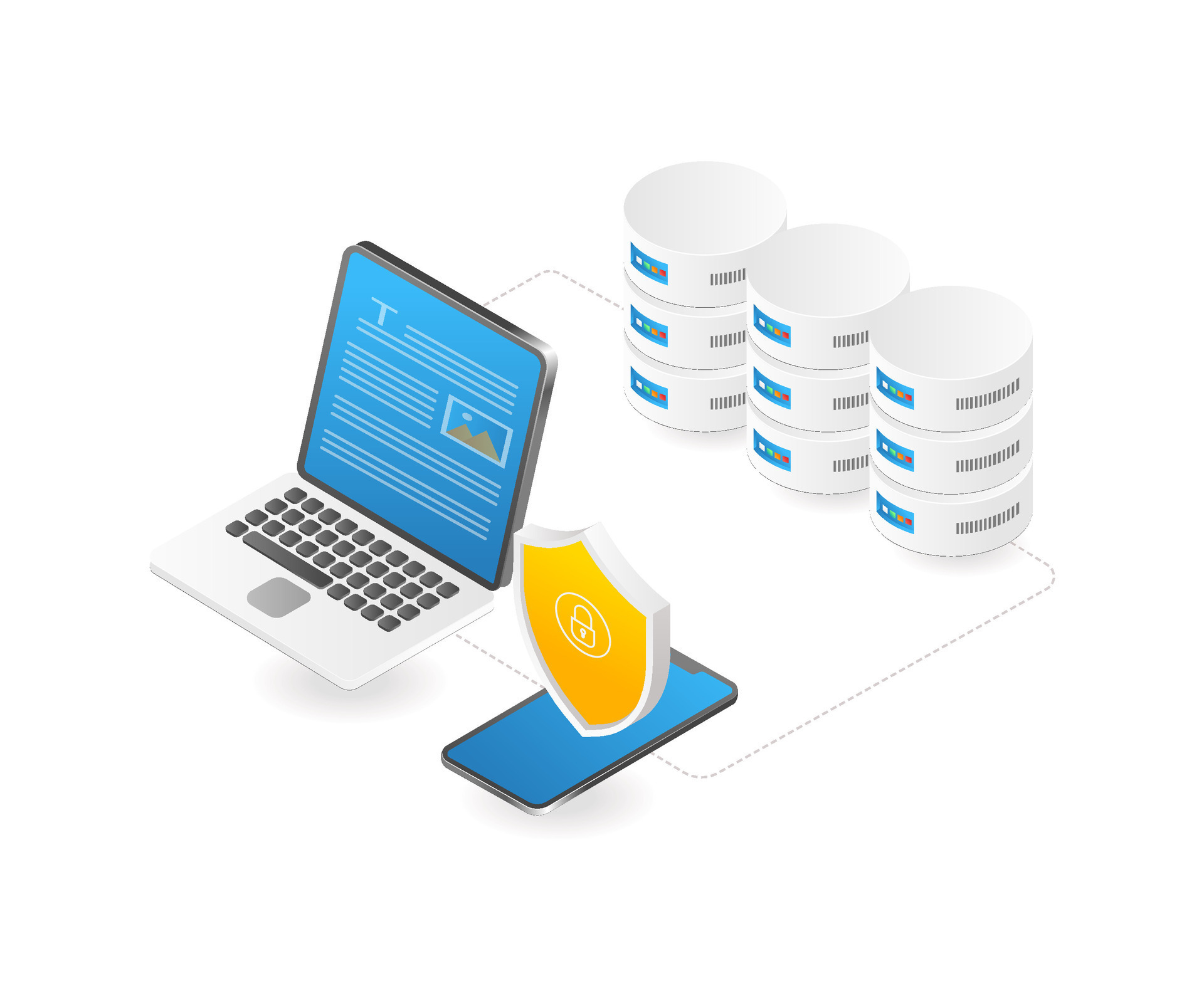Web app database list: best database and its importance

Every web application needs a database to store company, user, transaction, and other data. Choosing an authentic database in the digital world, where scalability, security, and reliability are paramount, can be difficult. Don't worry—we researched and came up with a comprehensive Web app database list. This blog will reveal the 12 best web application databases.
What is a database?
A database is a structured system for storing and organizing data, which facilitates the retrieval, management, and modification of information.
A database functions as an extensive digital filing cabinet, wherein data is systematically stored and arranged. This feature greatly simplifies the process of locating, organizing, and revising any required information. It is an indispensable component of software applications, serving a critical function in managing and monitoring extensive quantities of data.
Business Research Insight reports that the worldwide database management systems (DBMS) market is experiencing significant growth. According to projections, the market will increase from USD 38450 million in 2022 to USD 225148.44 million in 2031, expanding at a CAGR of 21.7% over that time frame. The worldwide database management systems (DBMS) market
What is the significance of a web app database?
Databases are critical to the development of web applications for several obvious reasons:
Data Storage and Management Applications require a secure location to maintain data, even when they are terminated or restarted. In order to accomplish this, databases maintain order through the use of tables and fields. This facilitates data verification, modification, and retrieval.
Managing Additional Users and Data
When more users increase the number of app sessions, databases assist in load management. They can expand by upgrading their hardware or by distributing their data across additional servers. This permits the application to accommodate more users without degrading.
Maintaining Data Consistency and Accuracy
Databases ensure the accuracy of all data modifications, particularly when a large number of users are concurrently accessing the application. Rules and checks are in place to ensure that the data remains accurate and in good condition.
Information Protection
Databases enable users to regulate access to and modification of data, a critical feature for ensuring the security of sensitive personal information. Additionally, they can encrypt information, rendering it difficult for unauthorized parties to decipher.
Rapid Access and Effectiveness
Databases utilize specialized operations such as indexing to locate information extremely quickly. This is ideal for applications that require information immediately. They are also capable of recalling frequent inquiries, which expedites the retrieval of identical information.
Top 12 Web Application Databases for 2024
Every company wants its 2024 web app to process and secure data accurately. If your web app needs such metrics, the following databases are best.
#1 MySQL
Web application databases like MySQL are popular and well-established. Every web developer knows MySQL configuration or can configure it. The first quarter of 2024 statista.com survey placed MySQL in the top five databases.
MySQL uses structured query language to connect to web and mobile apps. You can also use it to offer customers and stakeholders PaaS, SaaS, and DBaaS services.
Cross-platform compatibility lets it run on Windows, Linux, and macOS. Among its main features are:
- MySQL supports ACID (Atomicity, Consistency, Isolation, Durability).
- As a relational database, performance and loading speed are always high.
- It supports.NET, PHP, JavaScript, and other web application development languages.
- You can choose from MySQL Heatwave, which offers fully managed services with real-time analysis.
- It protects data integrity and confidentiality.
#2 MS SQL Server
Another relational database management software in the top five 2024 databases is Microsoft SQL Server. It's mostly used for large enterprise applications built with Microsoft technologies like.NET, ASP.NET,.NET Core, and more. It can be configured with another tech stack.
Web app developers trust Microsoft SQL Server for its easy scalability, tight security, and low maintenance. It also includes data protection, classification, misconfiguration alerts, and data monitoring.
The most popular features of Microsoft SQL servers are:
- Built-in analysis services for OLAP creation and management
- It helps move, copy, and transform data.
- Master data services help manage customers, products, and accounts.
- It enhances Microsoft Azure services to boost performance and cut development and maintenance costs.
#3 OracleDB
Oracle database is popular with businesses and governments due to its scalability, ease of use, and security. It's a commercial database management system with two main uses:On-line transaction processing and Data Warehouse
Oracle also offers multi-model relation DBMS functionality to improve multi-workload. Data handling and decision-making improve with AutoML integration. Moreover, its real application clusters offer users:
- Easy database instance scaling.
- Effective load-balancing.
- High data availability, redundancy, and flexibility for processing.
Additionally, choosing Oracle database in 2024 offers the following benefits:
- Its built-in RMAN restores crash data.
- It allows procedural programming with PL/SQL extensions.
- One server can host multiple Oracle instances.
- It conserves resources and money.
#4 PostgreSQL
PostgreSQL is a popular web application database. Free to download and configure due to its open-source license. In general, PostgreSQL extends SQL more efficiently. It is also safe and likely to preserve data integrity.
Additionally, you can create custom functions and data types. So, the app logic will run smoothly, and administrators can easily understand and manage the software.
Additionally, Postgres offers the following benefits:
- Apps can use multiple programming languages, and the database works without recompilation.
- Built-in disaster recovery features include PITR.
- It automatically supports LDAP, SSPI, SCRAM-SHA-256, GSSAPI, and other authentication methods.
- Full-text search and international characters are supported.
#5 MongoDB
MongoDB is another 2024 top-10 database. It is mostly used for large web database applications that process lots of data. It's a NoSQL database, unlike the others in this blog, which are relational.
A cloud-based MongoDB version complements the technology advancement. It can be deployed using AWS SDK, Azure, or another cloud infrastructure. As a multi-cloud database, it offers end-to-end encryption, automated resource scaling, and compatibility with all programming languages.
Other benefits of MongoDB include:
- It maximizes data availability across users.
- The flexibility of MongoDB boosts speed and performance.
- It can run on multiple servers for redundancy during server crashes and energy outages.
- It makes hierarchical relationships, arrays, and other data structures easy to implement.
#6 Apache Cassandra
NoSQL database Apache Cassandra has a distributed infrastructure advantage. Many large companies use it due to its extensibility and availability. Cassandra is one of the top six web application databases due to its fault tolerance.
When developing a mission-critical application like a security system that analyzes real-time logs and reacts, use Cassandra. It also replicates data automatically and is stable even with thousands of requests.
Additionally, Apache Cassandra offers the following benefits:
- You can choose asynchronous or synchronous replications for every update.
- It maintains data availability during regional outages.
- It prevents cloud or on-premises infrastructure losses.
- It guarantees users accurate output and no bottlenecks.
- New machines can be added without downtime due to its flexible architecture.
#7 IBM DB2
An advanced cloud-native database, IBM DB2 is designed for real-time and low-latency applications. It works on Linux, Windows, and Unix. Due to its speed and support for non-relational and object-relational features, most professionals consider it.
IBM also guarantees data availability, integrity, and exponential scalability with this database. Additionally, it cuts real-time notification time by 90%. With IBM BD2, we can reduce a 100-second notification to 10–20 seconds.
Additionally, IBM DB2 offers:
- Mission-critical applications benefit from its built-in security.
- Train AI and machine learning models with it.
- It protects cloud data with encryption, masking, and access controls.
- It reduces OLTP/OLAP development and maintenance.
#8 Elastic Search
When speed and relevancy are key, Elastic Search is a top custom web application database. Developers mostly use it for new apps with AI to handle large amounts of user data. Additionally, it can seamlessly connect to external LLMs.
Elastic search finds CRED, Udemy, Shopify, Slack, Uber, and other Fortune 500 companies. It can be combined with structured, metric, geo, and unstructured user searches. For better analysis, it explores data patterns.
Elastic search's top features and benefits set it apart from other databases:
- It maintains top speed regardless of data size or type.
- It stores geo and numeric data in BKD trees.
- It works for MVPs and full apps.
- It handles billions of queries and events well.
- Failures are detected and relevant operations are performed automatically to maintain data availability.
#9 Neo4j
Neo4j is a reliable graph database for web apps. The main difference between Neo4j and other databases is storage format. Instead of documents and tables, it stores data as nodes and relationships. Neo4j is flexible because it has no fixed structure.
Neo4j is used by Adobe, Airbus, Nasa, Vanguard, Intel, and others. It removes all constraints, enabling machine learning, data science, visualization, cyber-security, and analytics operations.
Neo4j has additional benefits:
- ACID and UNIQUE are supported.
- You can use indexes with an Apache License.
- SQL commands can be executed via its interface.
- It scales horizontally for high throughputs and datasets.
- Integrate with real-time apps to give users accurate, timely output.
#10 Firebird SQL
Firebird is an open-source SQL database. It can be configured on macOS, Windows, Linux, and Unix. Interbase forms the basis of Firebird SQL, but the code is written from scratch.
The best web application database for multi-platform users. Firebird can run on multiple platforms with a single configuration, saving time and money. It also guarantees high concurrency, speed, and data availability during peak hours.
Top Firebird SQL features:
- Supports multiple languages.
- The free version saves money on development and maintenance.
- A cross-platform database.
- Database availability and concurrency are high.
- Secure features are integrated.
#11 Redis
Redis is popular with web app developers because it's versatile. It can serve as a database, message broker, streaming engine, and cache memory for faster execution. It's also an open-source database technology that allows logic customization for business needs.
Redis can also be used to build real-time FinTech apps. It also supports high-throughput, low-latency software. Additionally, its caching mechanism speeds API calls, computations, and session states.
Additional leverages are listed below:
- It supports lists, sorted sets, hashes, and streams in memory.
- It allows Lua server-side scripting and stored procedures.
- You can extend its functionality with C, Rust, and C++ APIs.
- It strongly supports Python, NodeJS, and.NET Core.
- You can build searchable JSON apps with its stack server.
#12 MariaDB
A web developer or web app development company will likely mention MariaDB or MariaDB servers. One of the most popular relational databases, it uses MySQL. Linux distributions include it by default. It offers column-based storage and parallel distributed architecture. Openness lets web application database developers customize it easily. It will perform and stay stable during heavy traffic.
You can also enjoy its exclusive advantages:
- Configuration resources for MariaDB are abundant.
- Includes InnoDB and XtraDB.
- Provides maximum uptime due to Galera Cluster.
- Applications are fully supported and stability is optimized.
- Increases performance with new storage engines.
Last thought
In conclusion, as we navigate the dynamic landscape of web application development, it becomes increasingly clear that choosing the right database service provider is paramount. Among the top contenders stands Axalize, renowned for its exceptional features, robust infrastructure, and unparalleled support. By harnessing Axalize's innovative solutions alongside other leading database options, developers can fortify their applications with unmatched efficiency, scalability, and user-centric experiences, ensuring they remain at the forefront of the digital era.


